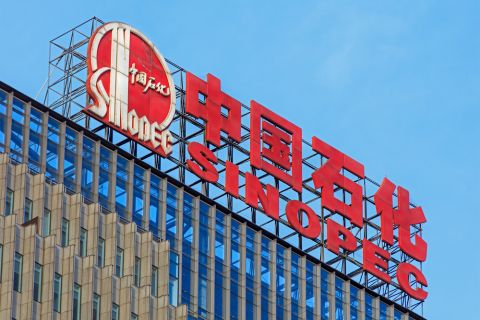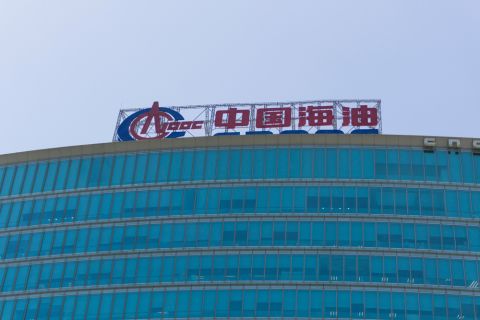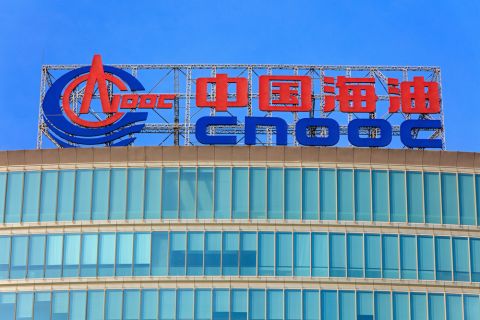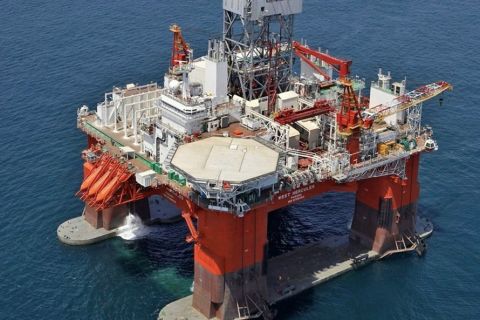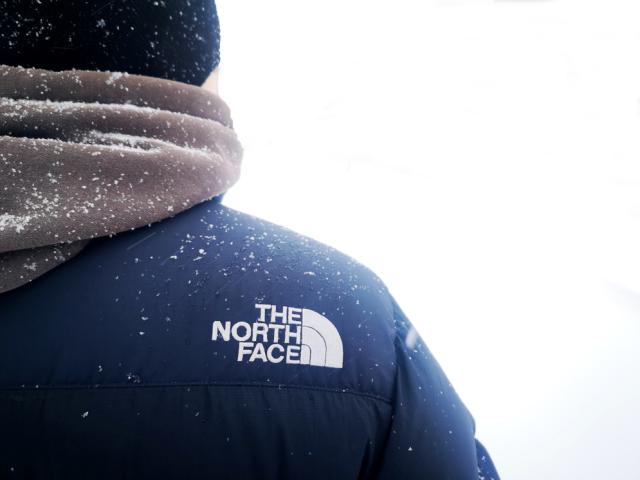
Pictured is a black jacket by The North Face. Hart Energy reached out via email to VF Corp., the corporate owner of The North Face for a response to Anderson’s letter and has not received a direct response as of yet. (Source: Shutterstock.com)
Adam Anderson, CEO of Innovex Downhole Solutions Inc., only wanted to buy his employees a Christmas present. Little did he know he’d be thrust into a social media frenzy and become the unlikely center of attention in an ESG movement that is increasingly gripping global businesses, including the oil and gas industry.
It all started when his order for 400 jackets from popular outdoor apparel brand The North Face was rejected. Why? According to Anderson, he was told by his distributor that The North Face rejected the order because Anderson wanted to put the Innovex logo on the jackets, and the company rejected the idea of placing an oil and gas services company logo on its jackets.
It was a curious stance for The North Face to take considering Anderson had received lower quantity orders with his company logo on The North Face jackets in the past. In addition, as many Twitter and Facebook users pointed out, the jackets are made with Nylon, which is a petroleum-based product.
While Anderson never received a direct response from The North Face or its corporate owner VF Corp., the distributor told Anderson it was told it could not put the Innovex logo on the jackets because it was “not consistent with its brand standards, which they told him was because we are an oil and gas company,” Anderson told Hart Energy in an interview.
“Officially, they don’t put that in their terminology, but they told him it’s because if you look at their official disclaimer it references other companies they wouldn’t want to be co-branded with such as alcohol, tobacco, porn,” Anderson continued.
Anderson was able to find another company to sell him the jackets through the distributor—Eddie Bauer. For many executives that may have been the end of the story, but for Anderson, the episode awakened a frustration he said he’s felt for a long time.
“The jackets are one thing and the solution to that problem isn’t really a big deal, but I think it really hit a nerve—the idea of the population in general and even within our industry of apologizing for what oil and gas does,” Anderson said. “What we do is good for humanity and good for the world. Like everything, there’s trade-offs. But I think somehow in the oil and gas world, we only talk about the small portion of challenges. We don’t talk about the 99% of oil and gas which is great for humanity.”
He’s not alone. Industry messaging in the rising age of ESG (environmental, social and governance) among investors and anti-fossil fuel sentiment among the public, has become a prime topic of discussion within oil and gas circles. Hart Energy’s own virtual DUG conferences held this fall had their fair share of passionate discussion on why and how the industry should speak up for itself.
Anderson decided he would speak up and penned a letter to VF Corp. CEO Steve Rendle in which he wrote “low-cost, reliable energy is critical to enable humans to flourish.”
In the letter, Anderson proudly trumpeted the benefits of oil and gas on society and the progress the industry has made in reducing harmful emissions into the atmosphere. He also pointed out the irony of The North Face’s stance given the influence of fossil fuels on its products and businesses. “Without oil and gas there would be no market for, nor the ability to create, the products your company sells,” he wrote.
It was that last point that helped the letter go viral thanks to industry social media influencers such as EnergyFinTwit (#EFT) and tweets from notable names such as U.S. Rep. Dan Crenshaw (R-Texas).
“Ah yes, North Face, who is fully divested from oil and gas except for… their supply chain, synthetic petroleum-based materials, transportation, retail stores, and manufacturing. Virtue signaling is exhausting. Stop it,” Creshaw tweeted in response to a story by KOSA-TV in Midland-Odessa posted on Dec. 11.
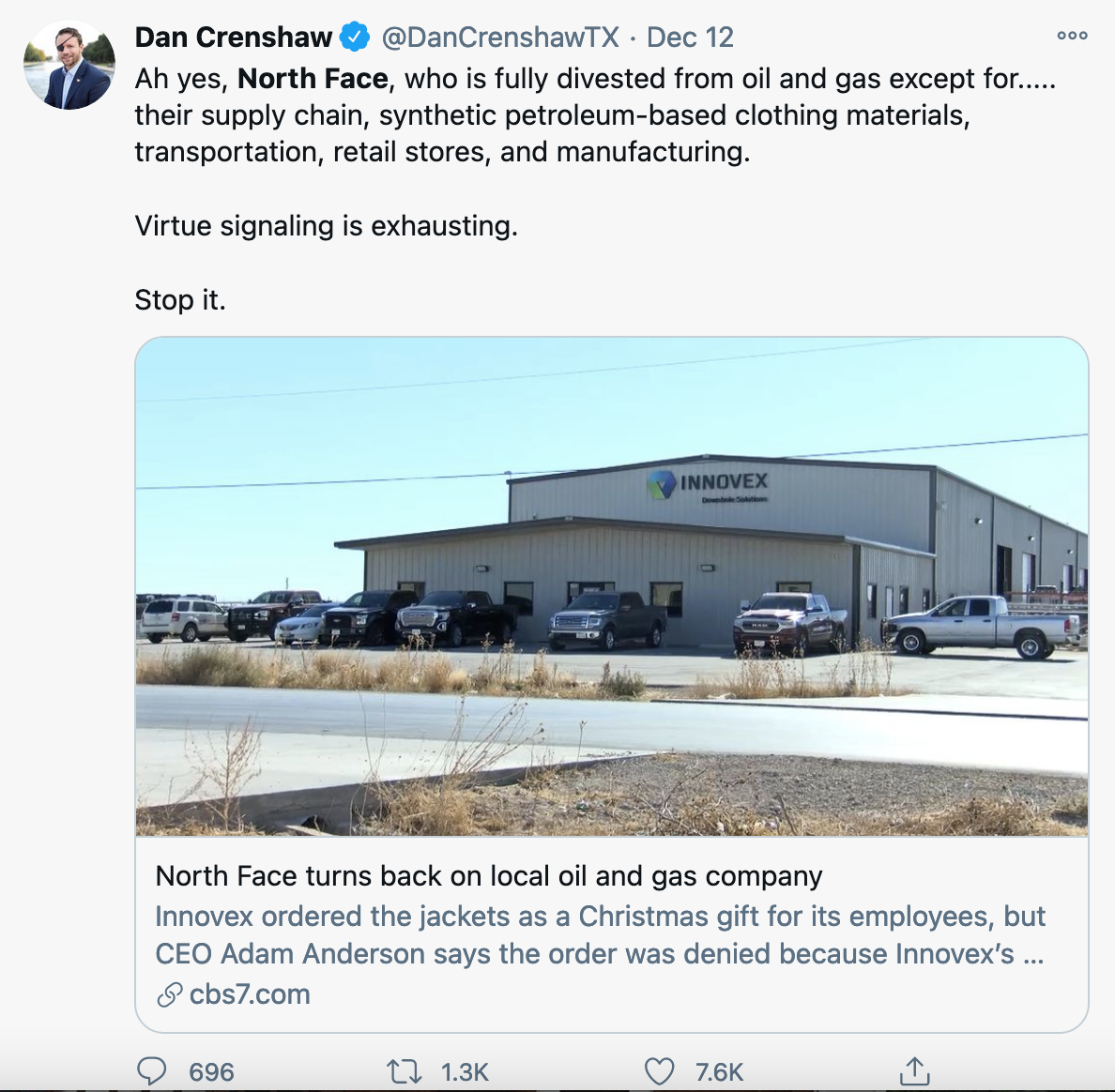
“I was flabbergasted by the attention the thing has gotten,” Anderson said. “I’ve gotten feedback from a couple of folks at much larger businesses that said they had the exact same issue with North Face in the last year or two years and they didn’t do anything about it.
“I guess everyone gets themselves wound up in the ESG world and wants to apologize for what we do,” he continued. “It’s a problem. Leaders in our industry have become focused on this idea of what we do is a ‘necessary evil.’”
Anderson also pointed out that he was inspired by the Alex Epstein book “The Moral Case for Fossil Fuels.”
The North Face saw plenty of criticism over the weekend, particularly after The Financial Times reported on Anderson’s letter. As speaker after speaker at industry events have pointed out recently, the risk of surrendering the messaging on fossil fuels to environmentalists and politicians can be lasting.
“The fiasco of ‘The North Face’ shows that ‘reality’ doesn’t matter. That is scary since the implications are severe: once you are labeled, who knows what’s next? Where is the outrage from the left about a company that dress them with cloth made from fossil fuel? #oil #OOTT,” industry speaker Anas Anlhajji noted in a tweet.
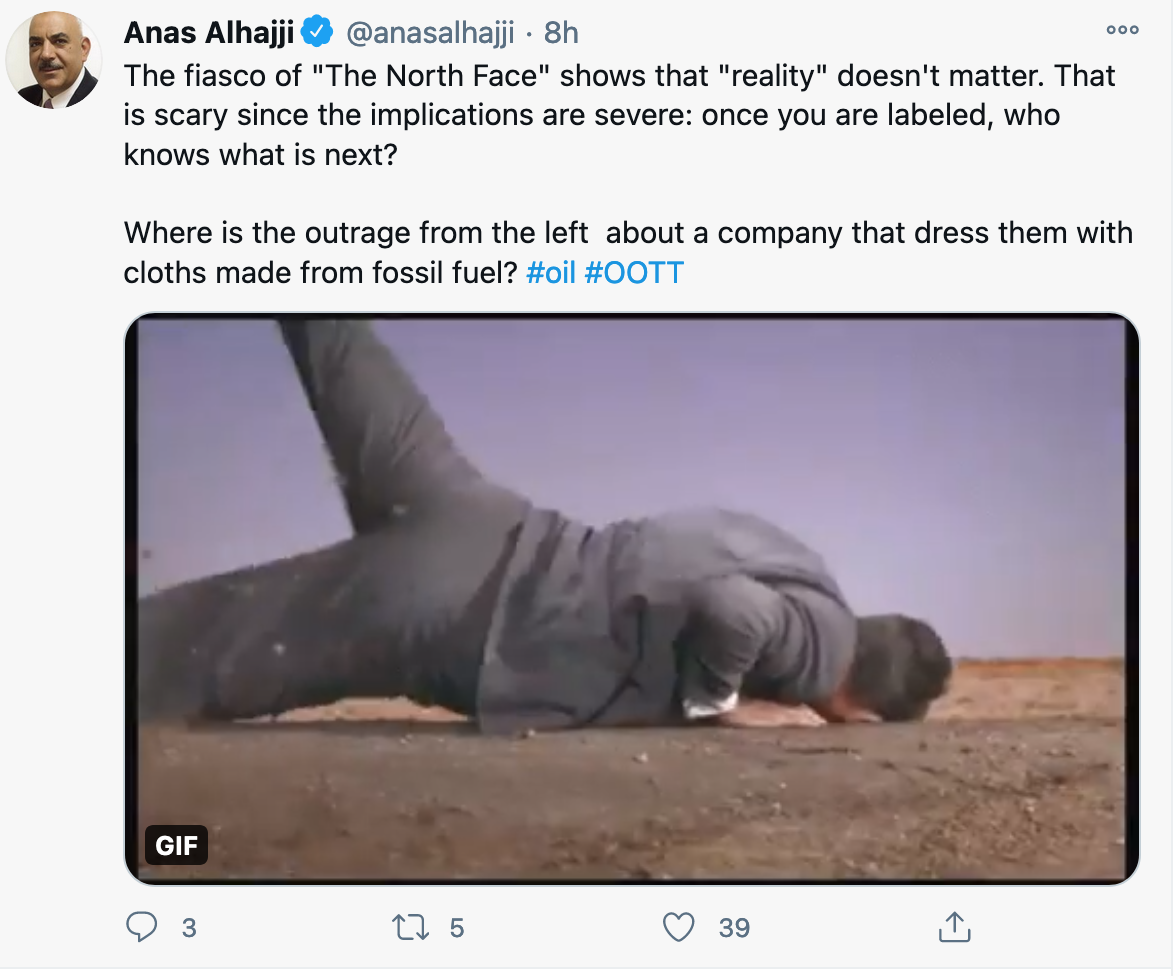
Hart Energy reached out via email to VF Corp. for a response to Anderson’s letter and has not received a direct response as of yet. However, in response to critical posts on its Facebook page, The North Face stated in a comment:
“Thanks for sharing your thoughts with us. We receive many requests from different companies or organizations to partner on co-branded product, and evaluate each individually based on multiple criteria, including product supply, time constraints, and if they align to our brand values. To respect the privacy of these organizations we keep the results of these decisions private.”
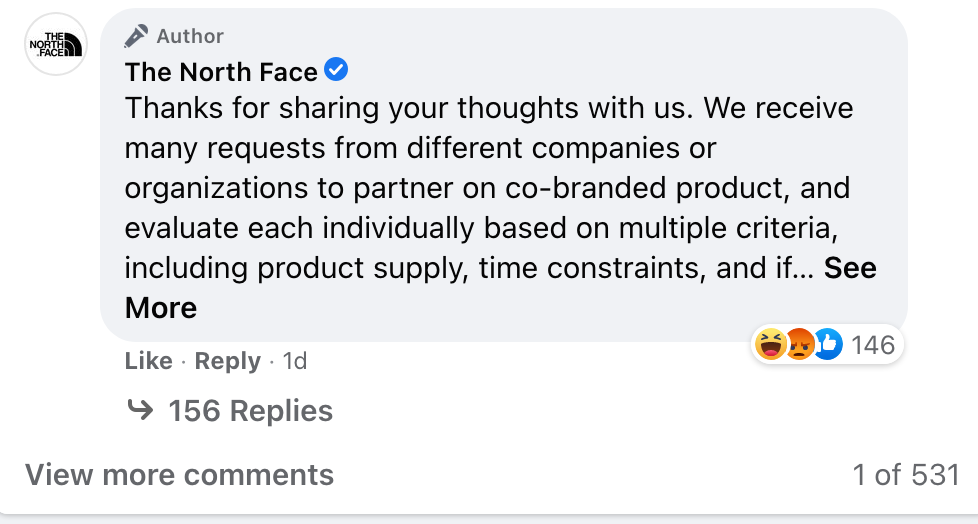
The North Face had social media support for its decision as well with Twitter comments to The Financial Times post of its article generally showing support for the apparel company. Though, those comments in support were far outnumbered by industry supporters elsewhere on social media who took the opportunity to let out their frustrations.
Overall, Anderson said he’s just a small player in the grand scheme of things but he hopes the oil and gas industry begins to take better care of its messaging to the public. That’s a sentiment shared by a growing number of industry executives and analysts.
Recommended Reading
Sinopec Brings West Sichuan Gas Field Onstream
2024-03-14 - The 100 Bcm sour gas onshore field, West Sichuan Gas Field, is expected to produce 2 Bcm per year.
Well Logging Could Get a Makeover
2024-02-27 - Aramco’s KASHF robot, expected to deploy in 2025, will be able to operate in both vertical and horizontal segments of wellbores.
CNOOC Makes 100 MMton Oilfield Discovery in Bohai Sea
2024-03-18 - CNOOC said the Qinhuangdao 27-3 oilfield has been tested to produce approximately 742 bbl/d of oil from a single well.
CNOOC Finds Light Crude at Kaiping South Field
2024-03-07 - The deepwater Kaiping South Field in the South China Sea holds at least 100 MMtons of oil equivalent.
Orange Basin Serves Up More Light Oil
2024-03-15 - Galp’s Mopane-2X exploration well offshore Namibia found a significant column of hydrocarbons, and the operator is assessing commerciality of the discovery.

